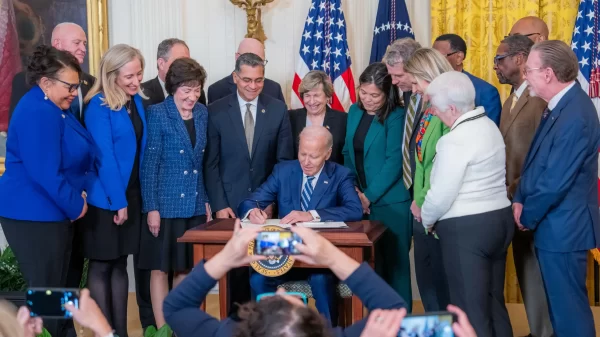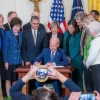Beginning Thursday, most Alabama households with children will begin receiving monthly payments, thanks to President Joe Biden’s expansion and changes to the federal child tax credit. The move is expected to lift as many as 160,000 Alabama children out of poverty.
Those changes expand the number of families who are eligible for the child tax credit – including those who before made too little income to receive the full credits – increase the amount of the credits per child and will distribute the benefits monthly, instead of at the end of the year when families file taxes.
Under the changes, families who do not opt out will receive half of the benefits monthly, and the remainder when they file taxes. The changes currently only extend to the end of 2021.
Families will receive up to $250 a month for every child between 6 and 17 years old, and up to $300 a month for children under 6. The remainder of the child tax credit – which totals between $3,000 and $3,600 per child – will be sent out at tax time.
Prior to the change, families could receive up to $2,000 in tax credits per child, and low-income households often made too little to receive all of those credits.
Families who signed up to receive stimulus checks with the Internal Revenue Service, and those who filed tax returns in 2019 or 2020, will automatically receive those monthly payments, unless they opt out.
Families who didn’t file taxes in 2019 or 2020, or sign up for stimulus checks, must use the IRS’s Non-filer sign up tool to receive the monthly payments.
Married couples with income up to $150,000 and single parents who file taxes as head-of-household with income of up to $112,500 are eligible for the full expanded child tax credits.
Jim Carnes, policy director at Alabama Arise, a Montgomery-nonprofit that advocates for the low-income, told APR on Monday that the changes are a tremendous boost for Alabama families, and stand to lift as many as 160,000 Alabama children above the poverty line. The program is expected to reduce child poverty by 45 percent in the U.S.
A Center of Budget and Policy Priorities study found that approximately 4.1 million children in the U.S. will be lifted out of poverty through the program.
The child tax credit has always been beneficial to families with children, but the lowest income families didn’t benefit as much as others, Carnes explained.
“The wonderful thing about this plan is that it allows everybody in those lower income levels to participate to the full amount. It’s just gonna be a huge lift for those people,” Carnes said.
There’s a push, largely by Democrats, to extend these changes beyond 2021, which Carnes said would put the U.S. in line with countries that have child allowances, including the United Kingdom and Canada.
“Which is a slightly different policy, but functions in much the same way,” Carnes said. “We would very much support making these changes permanent.”
President Joe Biden would like to extend the program to 2025, but Congress would have to agree to do so.
The Center on Budget and Policy Priorities study found that making the program permanent would benefit 93 percent of Alabama’s children, lift 162,000 Alabama children under 18 above or closer to the poverty line and benefit 480,000 children under 17 who were previously left out of the full $2,000 credit.
“I’m hopeful,” Carnes said of extending the program. “I think this is going to be a very popular move. It’s going to be interesting to see how families respond to this.”
Carnes said it’s going to be a challenge to make sure that families who could benefit from these changes, but who haven’t filed taxes in the last two years or signed up with the IRS to receive stimulus payments, know how to sign up and receive the monthly payments.
“We’re hoping that that will become a real grassroots push. That all kinds of organizations will get involved in sharing that information,” Carnes said.
Families who didn’t file taxes in 2019 or 2020, or sign up for stimulus checks, can visit the IRS’s Non-filer sign up tool to sign up and receive the monthly payments.






















































